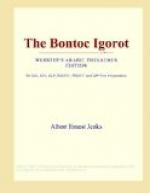tayo
You
’kayo or ’dio
They
’ra or ’cha
The verbal suffixes seem to be commonly used by the Bontoc Igorot in verbal formations. The tense of a verb standing alone seems always indefinite; the context alone tells whether the present, past, or future is indicated.
Comparative vocabularies
About eighty-five words have been selected expressing simple ideas. These are given in the Bontoc Igorot language and as far as possible in the Benguet Igorot; they are also given in the Malay and the Sulu languages.
Of eighty-six words in both Malay and Bontoc 32 per cent are clearly derived from the same root words, and of eighty-four words in the Sulu and Bontoc 45 per cent are from the same root words. Of sixty-eight words in both Malay and Benguet 34 per cent are from the same root words, and 47 per cent of sixty-seven Benguet and Sulu words are from the same root words. Of sixty-four words in Bontoc and Benguet 58 per cent are the same or nearly the same.
These facts suggest the movement of the Philippine people from the birthplace of the parent tongue, and also the great family of existing allied languages originating in the primitive Malayan language. They also suggest that the Bontoc and the Benguet peoples came away quite closely allied from the original nest, and that they had association with the Sulu later than with the Malay.
[In the following compilation works have been consulted respectively as follows: Malay — Hugh Clifford and Frank Athelstane Swettenham, A Dictionary of The Malay Language (Taiping, Perak; in parts, Part I appearing 1894, Part III appearing 1904); Sulu — Andson Cowie, English-Sulu-Malay Vocabulary, with Useful Sentences, Tables, etc. (London, 1893); Benguet Igorot — Otto Scheerer, The Ibaloi Igorot, Ms. in Ms. Coll., The Ethnological Survey for the Philippine Islands.]
English
Malay
Sulu
Benguet Igorot
Bontoc Igorot
Ashes
Abu
Abu
De-pok
Cha-pu’
Bad
Jahat (wicked)
Mang-i, ngi
...
Ngag
Black
Hitam
Itam
An-to’-leng
In-ni’-tit
Blind
Buta
Buta
Sa-gei a ku’-rab[44]
Na-ki’-mit
Blood
Darah
Duguh
Cha’-la
Cha’-la
Bone
Tulang
Bukog
Pu’-gil
Ung-et’
Burn, to
Bakar
Sunog
...
Fin-mi’-chan
Chicken
Anak ayam
Anak-manok
...
Mo-nok’
Child
Anak
Batah, anak
A-a’-nak
Ong-ong’-a
Come
Mari
Mari
...
A-li-ka’
Cut, to
Potong
Hoyah
Kom-pol’
Ku-ke’-chun
Day
Hari
Adlau
A-kou
A-qu’
Die, to
Mati
Matai
...
Ma-ti’
Dog
Anjing
Erok
A-su’
A’-su
Drink, to
Minum
Hinom, minom
...
U-mi-num’




